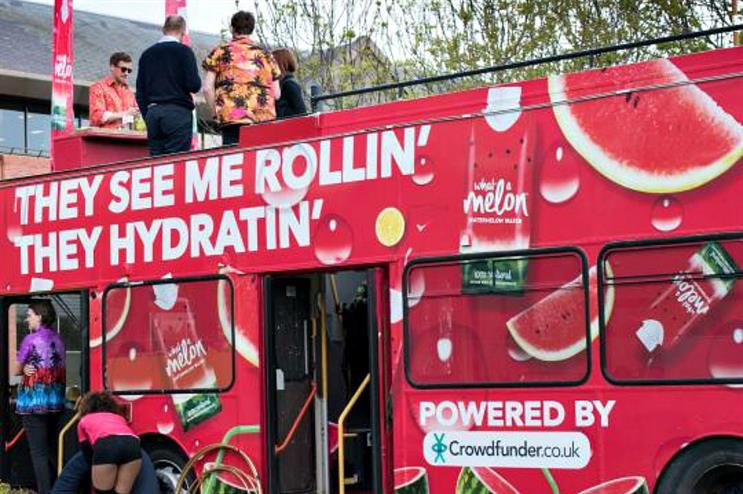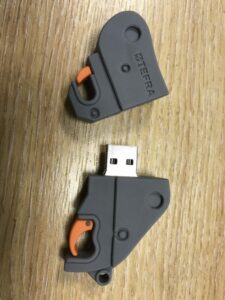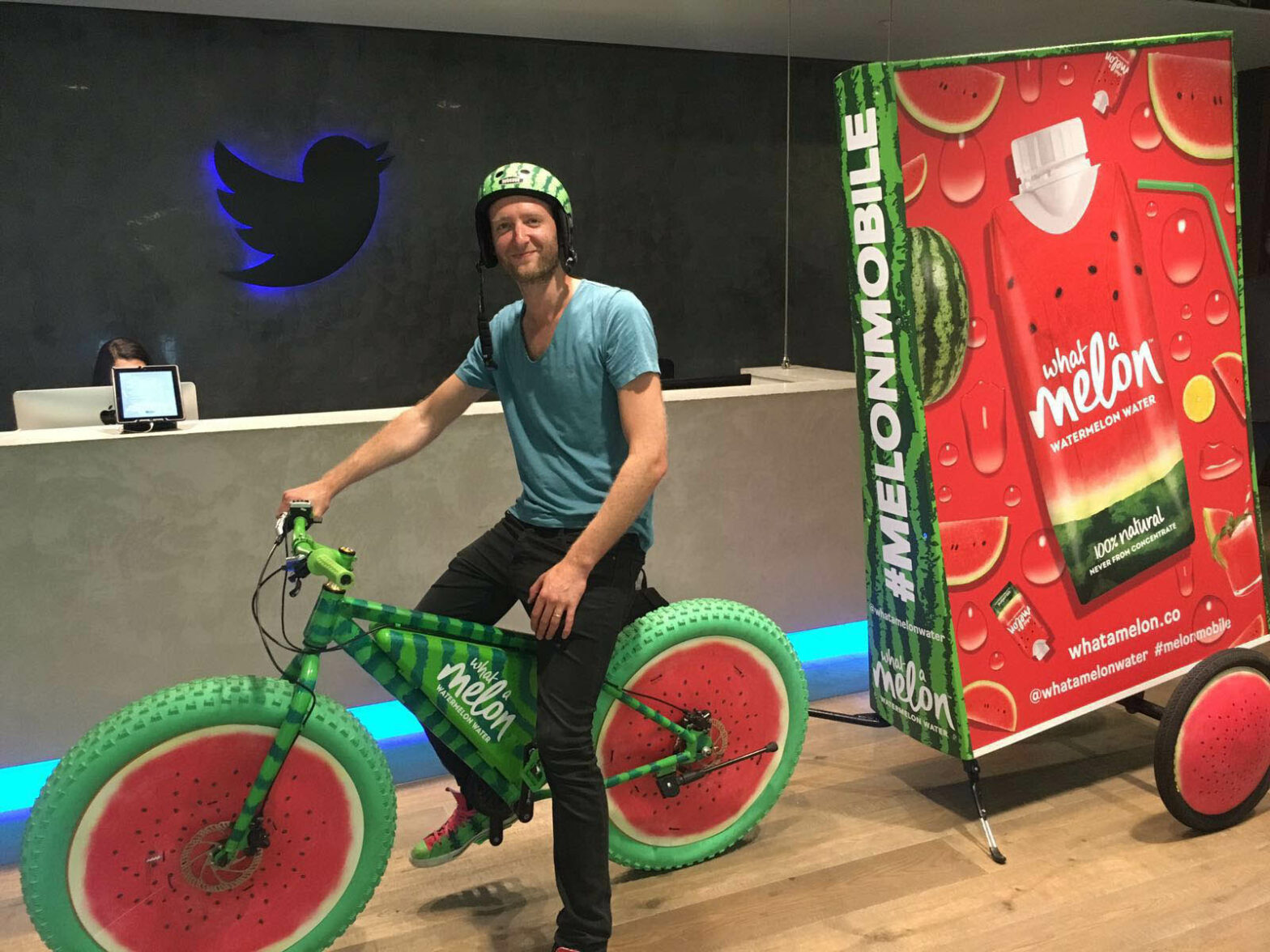Guerrilla marketing is described as an advertisement strategy concept ‘designed for businesses to promote their products or services in an unconventional way with little budget to spend’.
It involves high energy and imagination focusing on grasping the attention of the public in more personal and memorable level, and can be a cost-effective way of publicising your small business – if you get it right.
Olly Bolton and Tom Procter, co-founders of drinks business What A Melon, entered Richard Branson’s Virgin Voom competition this year, and won the Crowdfunder element of the competition.
Part of the prize was a double decker bus, which became the product of a guerrilla marketing initiative. ‘We have since gone on to modify it somewhat by wrapping it completely in watermelon colours, chopping the roof off and creating a cocktail bar on the roof.

The bus is hugely engaging and we actually parked it outside Selfridges when we secured a listing at the beginning of July,’ the pair say.
The company has used electric bikes (e-bikes) with watermelon-themed wheels to raise brand awareness and engage with consumers in places where traditional sampling might not reach.
‘We have employed a dedicated team of two, each costing £10 per hour, for the entire summer working from 11am-8pm Monday to Friday which is proving extremely popular.’
The company has a chilled storage facility in Piccadilly where the bikes are re-stocked before heading out around London to hand out samples to consumers. Each evening the e-bikes also park up outside a different tube station, ensuring the brand reaches hundreds of thousands of commuters, all for the cost of employing two samplers.
‘We have also taken the bikes inside the likes of Twitter HQ, creating some awesome brand awareness from one of the biggest social platforms in the world. Targeting media houses has proved extremely beneficial in building great relationships with the likes of The Sun, Metro, Daily Express and STYLIST Magazine,’ says the duo.
The team believe guerrilla marketing has been crucial in terms of raising their brand profile and helping them secure stockists. ‘We very recently entered all 66 Itsu stores with the buyer commenting that she had seen one of the e-bikes and thought the brand looked great,’ they say. ‘It obviously wasn’t the deciding factor, however it certainly helped us get a foot in the door with them.’
And that’s a rap campaign
In the summer of 2015 Jim Cregan of Jimmy’s Iced Coffee decided to release a rap instead of a traditional TV advert. The concept was developed by innovation consultancy and the song was called ‘Keep Your Chin Up’ about starting a drinks business, encapsulating the entrepreneurial spirit and becoming debt free.
Fortuitously for the company, Channel 4 read about the rap in Campaign magazine and the broadcaster asked to run the whole video as an advert during a prime time show. For a fraction of the cost of creating their own ad, Jimmy’s rap drove brand awareness and secured a listing in Sainsbury’s, a first for the brand, and overall sales have increased by 40 per cent year-on-year in the period August-October 2015.
Two years ago, Cregan got back in front of the camera. The lyrics track the story of Jimmy’s, from a backroom experiment in a Bournemouth café to a recognised supermarket stocked brand. The rap called ‘Who Got The Beans’ carries a more personal and inspirational message for new businesses; encouraging them to take the leap of faith and join Jim.
The campaign secured more than 1 million views on YouTube (achieving 500,000 in three weeks), and social media growth of 50 per cent on Facebook and 400 per cent on YouTube compared to before the activity.
Hill Engineering manufactures safety attachment products for the construction sector. The company launched a campaign in December 2015 called #TefraOnTour which aimed to showcase the company’s products to new markets and generate new enquiries for the business.
The company invested in 500 USB pens that resembled their product, which were sent to prospective customers. The campaign was supported by activity on Twitter and LinkedIn, showcasing the product in some famous landmarks.

The campaign made a big impact, resulting in the company signing a large contract worth £100,000 per year with a client the company had been targeting, and the business expects another £300,000 in sales of the back of the campaign, projecting £500,000 in sales from a £3,000 investment.
It’s proof that getting original with your marketing can pay serious dividends.
Further reading on marketing
Guerrilla marketing – did it work for you?
Aaron Giles of The Great Escape Game
Our marketing strategy has a lot of emphasis on guerrilla and ambient tactics. In our first year of trading as The Great Escape Game we were faced with the challenge of getting our name out to as many people as possible, as quickly as possible, with as little cost as possible.
This led us to using guerrilla tactics due to its low cost delivering high impact! Furthermore, being an escape game we are creative, bold and daring so it was also a good fit for the brand.
We were launching our second ‘Homicide room’, which is themed taking inspiration from CSI and SAW. We knew we were not marketing to people hopes, dreams and desires instead, we were marketing to their nightmares.
In order to create awareness around the theme and story of our immersive escape room, we created a template of a body and began creating CSI style chalk outline adverts on high footfall areas of the city.
At the size of the average woman, they were almost impossible to ignore! The impact was immediate and our social media blew up with pictures people had taken of them, some with people laying inside the stencil! We became the talk of the town and the month we launched the campaign is still our highest turnover to date over 6 months down the line!
All in all the campaign cost no more than £700 and we are still getting customers today who when we ask the age old, ‘how did you hear about us?’ – they quote the body stencils.





